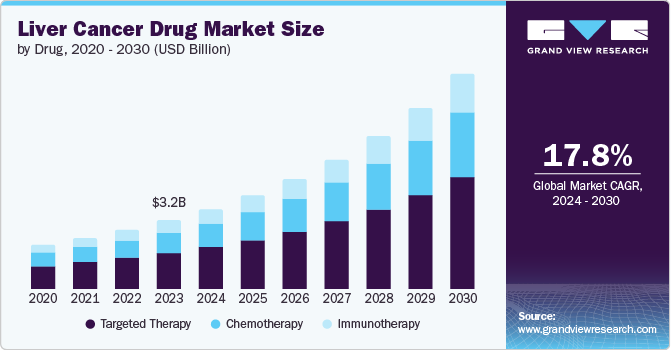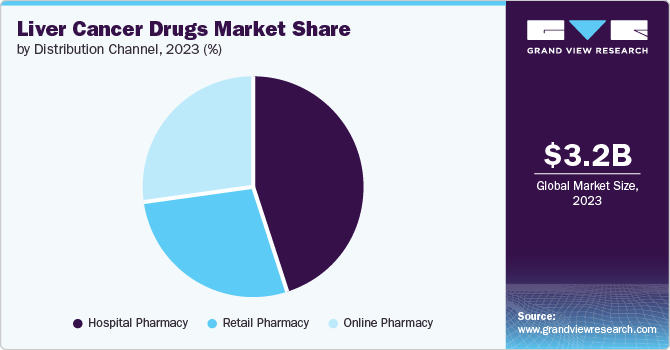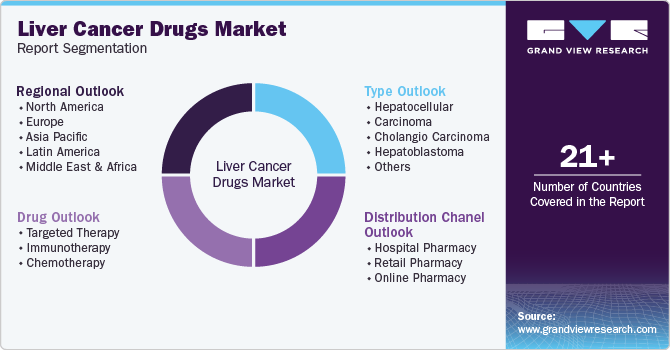- Home
- »
- Pharmaceuticals
- »
-
Liver Cancer Drug Market Size, Share & Trends Report, 2030GVR Report cover
![Liver Cancer Drug Market Size, Share & Trends Report]()
Liver Cancer Drug Market Size, Share & Trends Analysis Report By Drug (Targeted Therapy, Immunotherapy, Chemotherapy), By Type, By Distribution Channel, By Region And Segment Forecasts 2024 - 2030
- Report ID: GVR-2-68038-513-7
- Number of Report Pages: 100
- Format: PDF, Horizon Databook
- Historical Range: 2018 - 2022
- Forecast Period: 2024 - 2030
- Industry: Healthcare
Liver Cancer Drug Market Size & Trends
The global liver cancer drug market size was valued at USD 3.15 billion in 2023 and is projected to grow at a CAGR of 17.8% from 2024 to 2030. The rising prevalence of liver cancer, advancement in treatment options, growing awareness and early diagnosis, rising healthcare expenditure, technological advancement, rising investment in research and development (R&D), government initiatives to increase access to care and promoting research in oncology, are some the key drivers propelling the market growth.

According to the American Cancer Society, more than 800,000 people are diagnosed with liver cancer each year accounting for more than 700,000 deaths each year worldwide. Factors such as alcohol consumption, hepatitis B & C infections, obesity and fatty liver disease are expected to contribute to growing incidence rate of liver cancer. The development of novel therapies and treatment options for liver cancer, including targeted therapies, immunotherapies, chemotherapy and combination therapies, has fuelled the market growth. These advancements have improved survival rates and quality of life for patients. Increased awareness about the importance of early detection and diagnosis of liver cancer has led to more patients to seek treatment at an early stage.
The increasing healthcare expenditure globally, coupled with government initiatives to improve access to healthcare services, has contributed to the market growth. Technological advancement in healthcare is improving the diagnosis process. The rise of precision medicine allows for tailored treatment plans based on a patient’s need.
Drug Insights
The targeted therapy segment held the largest market revenue share of 53.0% in 2023 due to its precision in targeting specific molecules or pathways involved in the growth and spread of cancer cells. Targeted therapy aims to minimize damage to normal cells, thus reducing side effects and improving patient outcomes. In the case of liver cancer, targeted therapy has been identified as having promising results in inhibiting tumour growth and improving survival rates.
The immunotherapy segment is expected to grow at the fastest CAGR of 18.6% during the forecast period. Immunotherapy has shown promising results in treating liver cancer by harnessing the immune system to target and destroy cancer cells. This approach has demonstrated significant efficacy, leading to increased adoption and investment in immunotherapy for liver cancer treatment.
Type Insights
Hepatocellular Carcinoma (HCC) dominated the liver cancer drug market with a 36.6% revenue share in 2023. HCC Is the most common type of primary liver cancer. The high prevalence and mortality rate due to HCC is leading to research and development to find effective drugs and therapies. HCC has been challenging to treat and has limited treatment options which leads companies to invest in new and effective drugs and therapies. Growing awareness and early detection of liver cancer allows timely intervention and treatment driving the demand for the drug.
The Hepatoblastoma segment is expected to grow rapidly with a CAGR of 18.6% from 2024 to 2030. Hepatoblastoma is a rare disease that occurs in children. Genetic predispositions and exposure to certain toxins are contributing factors to an increase in liver cancer in children.
Distribution Channel Insights
Hospital pharmacy dominated the liver cancer drug market with a revenue share of 45.5% in 2023. The increasing prevalence of cancer and treatments & technologies available in hospital facility is driving the hospital pharmacy market growth.

Retail pharmacy is expected to witness growth at CAGR 18.9% from 2024 to 2030. The rapid growth of retail pharmacy in the liver cancer drug market distribution channel segment is propelled by factors such as the increasing incidence of liver cancer, advancements in treatment options, and expansion of pharmacy networks.
Regional Insights
North America liver cancer drug market held a revenue share of 42.7% in 2023. It is attributable to increasing awareness, advanced healthcare infrastructure and advanced medical technologies in the region.

U.S. Liver Cancer Drug Market Trends
The U.S. liver cancer drug market dominated the North America market with a share of 78.1 % in 2023 due to increasing investment in pharmaceuticals. The regulatory framework in the U.S. ensures only safe and effective drugs reach the market which increases trust of patients and healthcare providers in the drugs.
Europe Liver Cancer Drug Market Trends
The liver cancer drug market in Europe was identified as a lucrative region in 2023. The market is primarily driven by factors such as the growing elderly population, increasing incidence of liver cancer, advancements in treatment and diagnosis procedures and the rise in demand for minimally invasive cancer treatment techniques.
The UK liver cancer drug market is expected to grow significantly in the coming years due to increasing awareness about developed therapies and drugs and early detection of the disease. According to Liver Cancer UK, 16 people die from liver cancer and 17 new diagnoses are done each day. The Germany liver cancer drug market held a substantial market share in 2023 owing to early detection and improved healthcare facilities.
Asia Pacific Liver Cancer Drug Market Trends
Asia Pacific liver cancer drug market is expected to witness the highest CAGR of 20.2% from 2024 to 2030. This growth is due to the significantly increasing investments in liver cancer drug technologies across the region.
The India liver cancer drug market is expected to grow rapidly in the coming years due to increasing awareness and government initiatives to control cancer in the country.
The China liver cancer drug market held a substantial market share in 2023 owing to large patient population affected by liver cancer due to factors such as Hepatitis B virus infection and environmental pollution.
Key Liver Cancer Drug Company Insights
Some of the key companies in the liver cancer drug market includes Merck KGaA; Exelixis; Inc.; Eisai Co., Ltd.; Bristol-Myers Squibb Company.
-
Merck KGaA focuses on discovering, developing, and marketing pharmaceuticals. Its research areas include neurology and oncology. There prominent drugs include KEYTRUDA pembrolizumab used in combination with chemotherapy.
Key Liver Cancer Drug Companies:
The following are the leading companies in the liver cancer drug market. These companies collectively hold the largest market share and dictate industry trends.
- Exelixis, Inc.
- Merck KGaA
- Eisai Co., Ltd.
- Bristol-Myers Squibb Company
- Bayer AG
- Thermo Fisher Scientific Inc.
- Pfizer Inc.
- Eli Lilly and Company
- F. Hoffmann-La Roche Ltd
- Novartis AG
- Bayer AG
Recent Developments
-
In October 2023, The FDA granted fast track designation to the T-cell therapy BST02 developed by Biosyngen for treating all forms of liver cancer, including HCC and cholangiocarcinoma.
Liver Cancer Drug Market Report Scope
Report Attribute
Details
Market size value in 2024
USD 3.67 billion
Revenue forecast in 2030
USD 9.81 billion
Growth Rate
CAGR of 17.8% from 2024 to 2030
Base year for estimation
2023
Historical data
2018 - 2022
Forecast period
2024 - 2030
Quantitative units
Revenue in USD million and CAGR from 2024 to 2030
Report coverage
Revenue forecast, company ranking, competitive landscape, growth factors, and trends
Segments covered
Drug, type, distribution channel, region
Regional scope
North America, Europe, Asia Pacific, Latin America, MEA
Country scope
U.S., Canada, Mexico, UK, Germany, France, Italy, Spain, Denmark, Sweden, Norway, Japan, China, India, Australia, South Korea, Thailand, Brazil, Argentina, South Africa, Saudi Arabia, UAE, and Kuwait.
Key companies profiled
Merck KGaA; Exelixis; Inc.; Eisai Co., Ltd.; Bristol-Myers Squibb Company; Bayer AG; Pfizer Inc.; Eli Lilly and Company; F. Hoffmann-La Roche Ltd; Novartis AG and Bayer AG;
Customization scope
Free report customization (equivalent up to 8 analysts working days) with purchase. Addition or alteration to country, regional & segment scope.
Pricing and purchase options
Avail customized purchase options to meet your exact research needs. Explore purchase options
Global Liver Cancer Drug Market Report Segmentation
This report forecasts revenue growth at global, regional, and country levels and provides an analysis of the latest industry trends in each of the sub-segments from 2018 to 2030. For this study, Grand View Research has segmented the global liver cancer drug market report based on drug, type, distribution channel and region.

-
Drug Outlook (Revenue, USD Million, 2018 - 2030)
-
Targeted Therapy
-
Immunotherapy
-
Chemotherapy
-
-
Type Outlook (Revenue, USD Million, 2018 - 2030)
-
Hepatocellular Carcinoma
-
Cholangio Carcinoma
-
Hepatoblastoma
-
Others
-
-
Distribution Chanel Outlook (Revenue, USD Million, 2018 - 2030)
-
Hospital Pharmacy
-
Retail Pharmacy
-
Online Pharmacy
-
-
Regional Outlook (Revenue, USD Million, 2018 - 2030)
-
North America
-
U.S.
-
Canada
-
Mexico
-
-
Europe
-
UK
-
Germany
-
France
-
Italy
-
Spain
-
Denmark
-
Sweden
-
Norway
-
-
Asia Pacific
-
Japan
-
China
-
India
-
Australia
-
South Korea
-
Thailand
-
-
Latin America
-
Brazil
-
Argentina
-
-
Middle East and Africa (MEA)
-
South Africa
-
Saudi Arabia
-
UAE
-
Kuwait
-
-
Frequently Asked Questions About This Report
b. The global liver cancer drug market size was estimated at USD 3.15 billion in 2023 and is expected to reach USD 3.67 billion in 2023.
b. The global liver cancer drug market is expected to grow at a compound annual growth rate of 17.8% from 2024 to 2030 to reach USD 9.81 billion by 2030
b. North America dominated the liver cancer drug market with a share of 42.7% in 2023. This is attributable to rising healthcare awareness coupled with cloud-based technologies acceptance and constant research and development initiatives.
b. Some key players operating in the liver cancer drug market include Teladoc; Doctor on Demand; iCliniq; IBM; Intel Corporation; Philips Healthcare; McKesson Corporation; AMD Telemedicine; GE Healthcare; CardioNet Inc.; 3m Health Information Systems; Medic4all; CirrusMD Inc.; Cisco; and American Telecare Inc.
b. Key factors that are driving the market growth include increasing medicare reimbursement for telehealth services, reducing emergency room visits and hospitalization rate, and technological innovation in communication technology across the world.
Share this report with your colleague or friend.
![gvr icn]()
NEED A CUSTOM REPORT?
We can customize every report - free of charge - including purchasing stand-alone sections or country-level reports, as well as offer affordable discounts for start-ups & universities. Contact us now
![Certified Icon]()
We are GDPR and CCPA compliant! Your transaction & personal information is safe and secure. For more details, please read our privacy policy.
We are committed towards customer satisfaction, and quality service.
"The quality of research they have done for us has been excellent."





